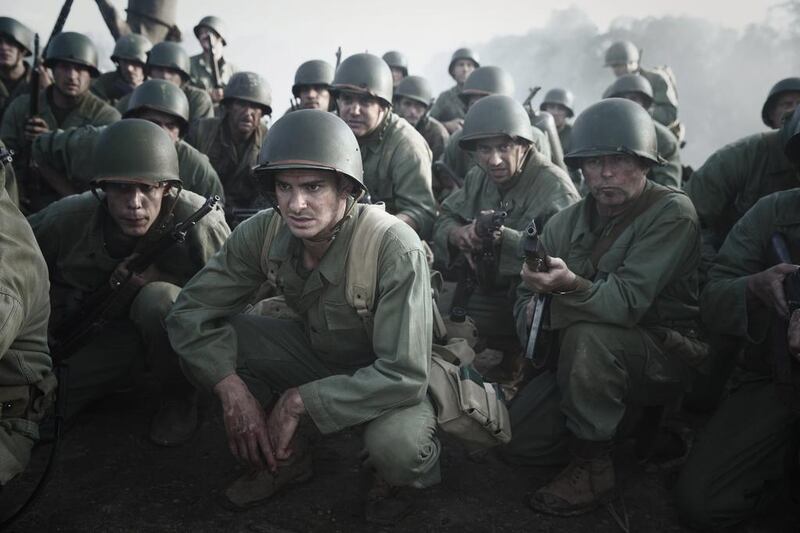Hacksaw Ridge
Director: Mel Gibson
Starring: Andrew Garfield, Vince Vaughn, Hugo Weaving, Teresa Palmer
Four stars
Is Hacksaw Ridge Mel Gibson's shot at redemption? Is it his atonement, or perhaps his miracle?
Such weighty theological pronouncements are pointless — though they have all been bandied about in the run-up to his first directorial effort since Apocalypto. That movie came out in 2006, a few months after Gibson's drunken, anti-Semitic rant made headlines around the world. It has plagued his career since.
Hacksaw Ridge, the latest addition to the list of big Second World War films, doesn't need any redemptive backstory. Whatever you think of Gibson, his filmmaking prowess is still evident. This big, bruising, viscerally violent, yet also often moving film should then, perhaps, be judged entirely on its merits.
Hacksaw Ridge stars the goofily appealing Andrew Garfield (The Amazing Spider-Man, The Social Network) as real-life war hero Desmond Doss. The film is not perfect, but it does strike an unusual balance. It is a violent film, the hero of which — and its moral core — resolutely espouses non-violence. It is a war film that will also appeal to a faith-based audience. It is a film that at times feels relentlessly corny — and the next moment, painfully, horribly real.
Doss, a Seventh-day Adventist, was the first conscientious objector to be awarded the Congressional Medal of Honor. An Army medic, he wanted to serve his country but refused to even touch a weapon, believing he should be saving lives, not taking them.
When the United States enters the war, he feels compelled to enlist, despite the objections of his loving, but abusive, father (played by the excellent Hugo Weaving), a First World War veteran who was destroyed by his wartime experiences.
Doss also goes against the wishes of his fiancée, Dorothy (Teresa Palmer), who begs him to stay. The couple’s scenes are charming but extremely retro and more than a little corny.
Doss arrives at training camp eager to serve, but when he refuses to touch a rifle, his superiors are furious.
“Private Doss does not believe in violence,” taunts a sergeant. “Do not look to him to save your life on the battlefield!”
He is played by Vince Vaughn, whose approach at first seems too comedic, as if from another movie, but settles into an effectively understated performance.
Doss is pressured to quit, subjected to beatings, harassment and ultimately a court-martial. He stands firm, and is ultimately sent to Okinawa in Japan, specifically the brutal battle at Hacksaw Ridge, high on a cliff where untold horrors await.
It is here that Gibson’s hand is the surest. The suddenness which with death comes in combat, the unfathomable randomness of it all, a man’s jaunty bravado rapidly crumbling into paralysing fear — the director sugar-coats nothing.
It is during this battle that Doss becomes a hero, saving countless men by persevering when most have been forced to retreat. Guided by his faith, at one point, he asks God out loud what is expected of him. Garfield makes such a scene feel honest — no easy feat.
Many fact-based movies end with real-life footage. It is always welcome but here, it is truly exciting to see the real Doss speaking (he died in 2006 at the age of 87). His is a story you probably did not know, and will be glad to learn. Gibson does him proud.
artslife@thenational.ae





